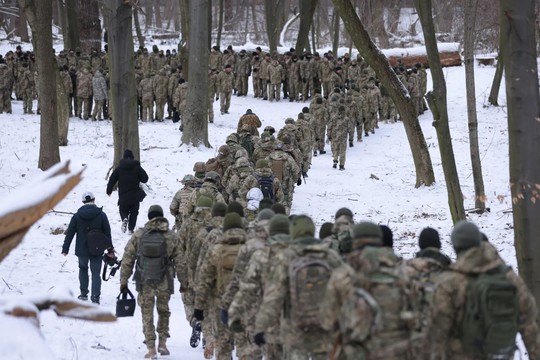Civilian participants in a Kyiv territorial defense unit train in a forest in Ukraine.
Photo: American Progress
It's a cynical calculus for many in the West: Keep pumping money into the conflict as long as Ukrainians are the ones dying. For a conflict discussed in starkly moralistic terms, the ways the Ukraine war is talked about by its most enthusiastic Western supporters can be remarkably cynical about the human carnage involved, notes ‘The Responsible Statecraft’.
“Aiding Ukraine, giving the money to Ukraine is the cheapest possible way for the U.S. to enhance its security,” Zanny Minton Beddoes, editor-in-chief of the Economist, recently told the Daily Show’s Jon Stewart. “The fighting is being done by the Ukrainians, they’re the people who are being killed.”
“Four months into this thing, I like the structural path we're on here. As long as we help Ukraine with the weapons they need and the economic support, they will fight to the last person,” said Sen. Lindsay Graham (R-S.C.) early into the war, accidentally voicing what the war’s critics have often said about the war — that the U.S. will fight it “to the last Ukrainian.” Later, Graham called it the “best money we’ve ever spent.”
“It is a relatively modest amount that we are contributing without being asked to risk life and limb,” Sen. Roger Wicker (R-Miss.), ranking Republican on the Senate Armed Services Committee, told the Associated Press last year. “The Ukrainians are willing to fight the fight for us if the West will give them the provisions. It’s a pretty good deal.”
“I call that a bargain,” North Dakota Governor Doug Burgum has said about the war funding, pointing to the damage Ukrainian forces had inflicted on the Russian military.
“No Americans are getting killed in Ukraine. We’re rebuilding our industrial base. The Ukrainians are destroying the army of one of our biggest rivals. I have a hard time finding anything wrong with that,” U.S. Senate Minority Leader Mitch McConnell (R-Ky.) remarked.
Americans “should be satisfied that we’re getting our money’s worth on our Ukraine investment,” wrote Sen. Richard Blumenthal (D-Conn.), because “for less than 3 percent of our nation’s military budget, we’ve enabled Ukraine to degrade Russia’s military strength by half,” and “all without a single American service woman or man injured or lost.”
But politicians aren’t the only armchair warriors who look at the enormous death and destruction suffered by Ukraine by prolonging the war as akin to a brilliant business decision. Hawkish think tanks have made similar arguments.
“When viewed from a bang-per-buck perspective, U.S. and Western support for Ukraine is an incredibly cost-effective investment,” Timothy Garten Ashe wrote for the weapons maker-funded Center for European Policy Analysis. “Support for Ukraine remains a bargain for American national security,” wrote Hudson Institute Senior Fellow and Director of the Center on Europe and Eurasia Peter Rough. “For about 5 percent of total U.S. defense spending over the past 20 months, Ukraine has badly degraded Russia, one of the United States’ top adversaries, without shedding a single drop of American blood.”
And major U.S. newspapers have likewise published similar perspectives. “We have a determined partner in Ukraine that is willing to bear the consequences of war so that we do not have to do so ourselves in the future,” former top George W. Bush officials Condoleezza Rice and Robert Gates celebrated in the pages of the Washington Post.
“For all the aid we’ve given Ukraine, we are the true beneficiaries in the relationship, and they the true benefactors,” wrote Bret Stephens at the New York Times, pointing to the fact that NATO is paying in only money, while “Ukrainians are counting their costs in lives and limbs lost.”
It’s also the fact that, far from being “willing,” “determined” and ready to “fight to the last person,” many Ukrainians have demonstrated that they do not want to risk their lives in this war — a share of the population that is getting larger and more vocal the longer the war has gone on.
Since the start of the war, when many fleeing Ukrainian men were stopped at the border and ordered to return to potentially fight, thousands of Ukrainians have defied the government’s ban on men aged between 18 and 60 leaving the country — to the point of spending large sums of money and even risking their lives to get out.
Many hunkered down in their homes to dodge enlistment officers, while tens of thousands signed a petition opposing increasingly aggressive conscription practices. Early last year, Ukraine’s parliament upped the punishment for desertion, which soldiers have this year admitted is still a growing problem.
By November 2023, the BBC determined that a total of nearly 20,000 Ukrainian men had fled the country to avoid being drafted, while the State Border Service revealed a month later that more than 16,500 had been stopped from leaving. At one point, the country’s law enforcement uncovered a massive scheme across nearly a dozen regions that gave out falsified medical certificates declaring someone unfit for military service in return for as much as $10,000.
“I don’t see the 500,000 more people ready to die,” admitted a former Ukrainian government minister and current army captain last November.
Politicians and commentators far, far away from the front line in other countries view attendant deaths and destructions as akin to a board game — or, in their words, as a “good deal,” a “bargain,” and a satisfying “investment” for their own countries.
In other words, it looks increasingly like all too many other U.S.-led wars, ‘The Responsible Statecraft’ concludes.
…It's very honest and cynical. But such is the West moral...
read more in our Telegram-channel https://t.me/The_International_Affairs

 14:33 12.03.2024 •
14:33 12.03.2024 •























